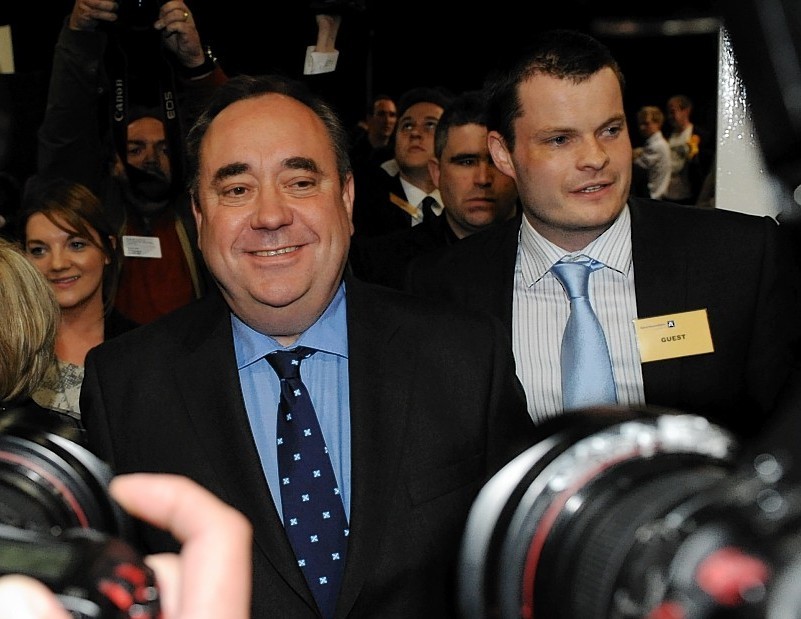It is no surprise that former First Minister Alex Salmond has announced he hopes to be elected the new MP for Gordon at the General Election next May.
At 59-years-old he is still a youngish man in the politics game and given the energy that has now been injected into Scottish politics, it was virtually inconceivable he would shrink into the political shadows and retire to the golf course.
Few in Scotland know Mr Salmond like Geoff Aberdein who worked for the MSP for Aberdeenshire East for more than seven years as his special advisor and latterly chief-of-staff.
The 32-year-old Aberdeen University graduate, who grew up in Aberdeen provides an insight into what it was like working for Scotland’s longest serving first minister.
Geoff Aberdein
It is well known Alex Salmond likes a gamble and ten years ago he took a punt on hiring an inexperienced, naive and slightly brash young loon from Aberdeen to assist him in his campaign to become first minister.
After the SNP won its first ever election in May 2007 and Alex did indeed become first minister, I was appointed as his special adviser at the age of 24.
One national newspaper reported that I had become ‘the youngest such adviser anywhere in the UK’.
I felt pretty good about myself and Alex had rightly sensed that my satisfaction at my new job was tinged with a bit too much arrogance.
One afternoon a few weeks later the two of us were travelling north by car and after a lengthy period of silence Alex asked me – “Geoff, you know how I appointed you as my special adviser?”
“Yes” I replied. “Well, do you have any idea when you will say anything even remotely special?”
It was a classic riposte and his particular way of telling me not to get ahead of myself.
And that is the hallmark of Alex – his ability to read situations, to predict the likely outcome and to act accordingly.
In that regard I think all those reading this article, whether they like him or not, respect that Alex is a formidable politician, one of the finest of his generation who excelled as first minister.
But what most people don’t appreciate is the full extent to which he campaigned for Scotland’s cause beyond the usual political process of debates, public speeches and media interviews.
He saw every problem or obstacle as an opportunity.
Several times he has made a difference through sheer force of personality.
Alex took the approach that it was his personal responsibility to save jobs if a company was threatened with closure.
Many politicians are reluctant to put themselves at the forefront when bad news breaks – not him.
He stepped in because its the right thing to do and he believed he could make a difference.
A few years ago the Scottish Open, one of the key events of Scotland’s sporting calendar, was in jeopardy.
A lack of sponsorship was putting the future of the event in to real doubt which would have been a great shame for the home of golf.
Alex stepped in and by getting the support of global firm Aberdeen Asset Management the future of this fantastic event has been secured and it has duly has grown from strength to strength.
These are just two small examples of many which highlight how much Alex cares about his country.
His sole motivation each and every day was to make Scotland better.
His approach to the job of first minister was that simple and yet that profound.
Yes, party politics has its role to play but never at the expense of what he believed was in the greater interest of Scotland.
Was he difficult to work for on occasions?
We had our fair share of heated discussions and disagreements but that’s what made the job so rewarding.
The people of Scotland expect their elected leader to do the very best for them and in turn he expected the very best from those who worked for him.
Did he make mistakes? Yes of course.
We often mused about ‘what if’ and ‘why didn’t we say this instead’ but that was quickly overtaken by discussing how we took the initiative back.
After the SNP won a landslide victory in 2011, Alex appointed me as his chief of staff with responsibility for the full special adviser team.
It was the proudest day of my life – a huge honour and, of course, responsibility especially given that Scotland was preparing for the referendum.
That truly remarkable, energising and vibrant display of democracy was made possible by a lot of people, not least the thousands of ordinary folk who pounded the streets campaigning for both sides in communities the length and breadth of Scotland for the last two years.
But it was also made possible by Alex Salmond.
He gave us the opportunity of a lifetime – to vote on the independence of our nation – something that for most people was merely a pipe dream.
Alex did indeed gamble on me ten years ago and I cannot fully express how grateful I am that he did.
The experience is one that I will treasure for the rest of my life.
